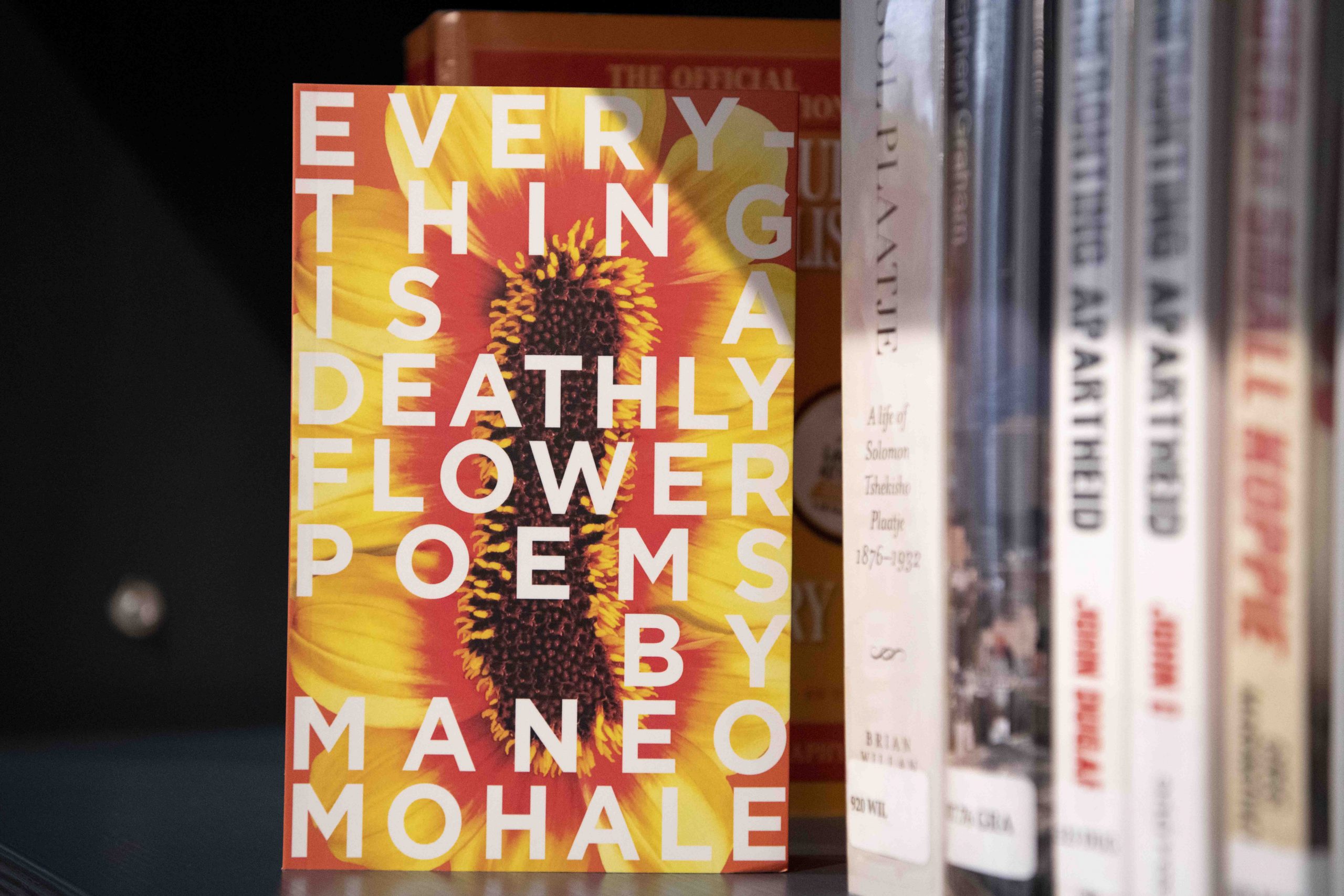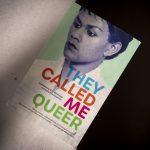Poetry Review | Everything is a Deathly Flower
Maneo Mohale’s debut collection revels in a quintessentially queer African aesthetic.
Author:
2 October 2019

Poetry is having its moment. More to the point, queer poets are starting to garner the kinds of acclaim owed to them, as they alter the landscape of language everywhere.
In the United States, Saeed Jones and Ocean Vuong are two of the global voices creating word forms anew. Abroad, queer and nonbinary African writers such as Romeo Oriogun and Akwaeke Emezi represent the plurality of voices emerging from Africa and its diaspora. In South Africa, poets such as Koleka Putuma have irrevocably altered the poetry landscape.
Maneo Mohale’s Everything is a Deathly Flower arrives into this lush poetic context, coinciding with growing international interest in African literature of all genres, while “springing forth in queer and radical new directions”. As the latest offering from uHlanga Press, the collection reveals how the imprint, alongside presses such as Modjaji Books, Deep South Publishers and new arrival Impepho Press are elevating queer voices in South Africa.
In Chibuihe Obi’s groundbreaking essay on queer Nigerians’ erasure from Nigerian literature, We’re Queer, We’re Here, Obi writes: “Queer literature is a subtext of the whole … part of the style and syntax.” Queer writers have always shaped langauge and literature. In this vein, and on this continent, where black queer femmes are under siege, poetry’s capacity for speaking from the periphery and catalysing change feels more urgent than ever.
How neatly old and new gods sit together
Set against a backdrop of East Rand grit and seawater, Mohale roots her poems in an “ancient” Benoni where “meijik” mothers who practice religion and “mouth magic” coexist with ghosts in “honeycomb” mine dumps. While this collection is grown around the effects of erasure, silencing and queer sexual assault, it is also a testament to the intrinsic joy and power of art-making and self expression as a queer black femme in South Africa.
Mohale examines her artistic and inner life through the lens of child and grandchild, plotting the ebbs and flows of her body and bloodline in the course of family secrets and the unspoken. This is “the water” from which she emerges, as a survivor, as a queer black femme, as an artist, as a “gift-mother”, turning to “a delta now/ un-sedimented and wide”.
In her opening poem, Letsatsi, Mohale traces the symbiotic relationship between Western religion, colonialism and sexual violence in South Africa, writing: “In school, you meet a man named cecil john/ and learn the word pioneer.”
Related article:
Foregrounding poems such as Baroma 1:26-28 and Little Monarch, Mohale reveals how “prayer is also gunpowder”, drawing evangelical parallels between colonisation and sexual assault: “I was a delicious border, inconveniently occupied/ terra nullius, but cuter, brown”. Or this line from Lobelia (Take a Seat): “let the bed be a border”.
Mohale seamlessly blends Sesotho, Setswana and English, artistically laying out the text in different ways which make spoken rhythm clear on the page. As a natural hybridist, the poet centralises the black queer experience in Abrahamic religions built for those who are straight, white and male, employing the imagery splitting and rooting to show the effect of this in phrases such as “two-hearted country” and “blood-blossomed archive”.
As a shamanic dance through empty political action against gender-based violence, 16 Days of Atavism sees Mohale pushing against these reductive societal forces, remembering that her worth is not transactional – that she is “of something more precious than glass”. Experimenting with form and legibility, the poet arranges her work in floral imagery and language, which is almost perfect. There are moments where metaphor could be more carefully delineated to allow for clarity, but these are minor concerns.
The language of flowers
With exquisite care, Mohale subtly details her poems with floral imagery, from “the shrubbed conversation of weeds” to the “citrused smile” of her abuser. From Gazania and Colocasia (Delta) to False Buchu, her poems take titles from flora that are both indigenous and alien to South Africa, evoking the scientific organising framework of Western science and calling to mind the politics of belonging. In doing so, she is also referencing gender binaries and the punishment meted out to those who reject its suffocating language and seek to “separate stigma from style”.
More than an organising principle – although it does so masterfully – Mohale’s use of floral symbolism adds a new layer of meaning to the poems through playful suggestion and a reinsertion of queer black femmes into historically unwelcoming spaces, while also bringing multiple meanings to flowers and plants.
A queer symbolism
With their uncanny ability to seed themselves, change sexes and create food from sunlight, flowers contain abundant queer symbolism. Their carnality and playful deviance are a joy amid the sterile “biology lecture halls”. It is a perfect insinuation: sexuality, like humanity, is as lethal as it is beautiful.
This use of coding, in flowers, is reminiscent of the covert ways queer folk have historically expressed themselves. (Night Jasmine, for instance, is itself a flower that only blooms at night, connoting bashfulness and virginity).
Related article:
One must ask: what is queerer than nature? Language. Cannibalising, flamboyant and eternal, poetry affords the queer community a vocabulary from which to construct and nourish their identities. In a reversal of this, Mohale signals the danger of disclosure and desire in Sandton Skye, which is dedicated to Karabo Mokoena, who was murdered by her boyfriend. Its heartbreaking epitaph, “I smell smoke” is foreshadowed in an earlier line in the collection, “Tonight, she is only as dangerous/ as dreams”.
The poet renders sexual assault in all its terrifying ugliness. As a metaphor, the poem title Dionea Muscipula (Venus Flytrap) evokes the carnivorous. In snatches of the “katlehong sky” and “Johannesburg summer/ temperature”, Mohale fragments time to mirror the way time feels when living with post traumatic stress disorder, until she herself is no longer present. There is only “the appetite” which requires the reader to “make your history digestible” only once “it’s had its fill”. Ingesting either the stem, petal or leaf from seemingly benign foxgloves or digitalis, also known as dead man’s bells, the flower mentioned in the title poem, leads to convulsions, delirium and ultimately death. It is a clever way to mirror the metastatic power of trauma and its medley of poisons.
The reader is offered relief from this tension through mouth-watering poems including the Ars Poetica series and Belief (Five Sunflowers). Part family portrait, part Van Gogh resonance, Belief (Five Sunflowers) offers us a meeting with Mohale’s chosen family, who are “blood-warm” despite not being related to her.
“I am looking for/ the dream”
Mohale grounds her origin story in the complex intersections of religion, queerness and African spirituality, and magically conjures a dream where societal structures no longer recreate ongoing situations whereby queer black femmes are continually violated.
“Everything/ is different in the dream. In the dream, I am safe forever.”
With a strong command of place, Mohale’s poems expand our consciousnesses. The poet builds tangible worlds out of dreams; hers is an architecture of “lovers’ teeth” and “effervescent laughter”. Mohale employs metaphor as prophecy in her design of safe spaces – geographic and psychic – for marginalised people.
“Every petal that fell/ from my mouth is a survivor”
Although the poet progressively explodes her sexual assault in the “night room”, until we are living inside its walls, watching its radioactive pain seep into the bedrock of the poet’s mind and family, she ultimately transcends it. In The Night Room, the poet summons the “vines to snake / around” her abuser’s “wrists like venom”, while “everything rises to protect” her.
Revelling in transcendence, Mohale evokes the transformative processes of alchemy, photography and photosynthesis, drawing from a rich visual and metaphoric palette in a sensual offset to the violent subtext of flowers. This has the arresting effect of invisible ink: a message twice legible through chemical reaction and careful reading, one of which recalls a photo of musician Fela Gucci, adorned in hoops of gold, clutching a bouquet of deep-red daisies. I don’t think it’s coincidence: Mohale threads the “meijik” presence of femmes throughout her collection like seams of gold, underscoring this with a maternity, a sacred safety and holding for other “survivors” who are “mother multiplied, more”.
A deliberate existence
Prophetic and profound, Deathly Flower is a re-peopling of mythic landscapes and holy books. Mohale demands to “sleep un-nightmared” and “leave the current that spits her out”. Celebration, being “crowned”, even “in trauma”, family-building and decadent art-making: these are the rights of queer African femmes and indeed a rite of survival.
Sublime as resurrection and subtly powerful, Everything is a Deathly Flower is part prayer, part potent balm for sexual assault survivors. With every reading, there is greater certainty that Mohale has achieved something profound for her community and for African poetry. Those cast out from the centre often ask who breathes the world on to the page. Who are our “twin-ventricled” messiahs, for instance, our gem-eyed demigods? Who are our angels and saints, our witnesses “translucent and gold as the goukamma”? Those who seek the answers will be pleased to find a new set in these pages. In this collection we find a wholly original assemblage of Mohale’s multitudinous visual and literary influences as a writer and fixture in our South African art scene, as she celebrates her chosen family of artists.
Mohale’s command of language, originality of voice and confluence of the mystic and material mark an exciting new moment for South African poetry. Deathly Flower is a supernova. It will earn Mohale many accolades, least of all, a “crown of flowers”.
Megan Ross is a writer and poet. Her first book, Milk Fever, was published by uHlanga Press.


